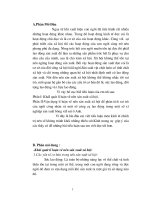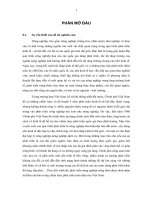phân tích vai trò của value chain (chuỗi giá trị) trong việc đánh giá năng lực tạo lợi thế cạnh tranh competitive advantage
Bạn đang xem bản rút gọn của tài liệu. Xem và tải ngay bản đầy đủ của tài liệu tại đây (178.88 KB, 15 trang )
1. Analyze the role of Value Chain in evaluating the qualification for
Competitive Advantage of the enterprise
2. Analyze the value and role of Stakeholders in your selected
enterprise
Answers
Sentence 1:
Definition value chain:
Value chain is the summary of the related operation chain of the
enterprise increasing the value for the enterprise. The efficient
performance of the activities in the value chain will decide the
efficiency of the general operation and creates the competitive
advantage of the enterprise. These operation chains can take place
according to the consecutive order or the parallel order. The value
chain is proposed by Michael Porter.
The value chain includes 02 components:
Primary activities and supporting activitis
Page 1 of 15
Figure 1 - Michael Porter Value Chain
1. Main activity: Covering practical activities occurring according to
the consecutive order. This group of activity is directly related to
the creation of the value for the products. The activities of this
group include:
- Inbound Logistics: receiving goods, transportation, and storage
of input raw materials. The input activities attach the receipt,
storage and management of input factors like the management
of materials, storage, control of inventories, transport plan,
goods returning to the supplier. The completions in any activity
in these activities result to the reduction of the cost and increase
of the capacity.
Page 2 of 15
In any enterprise, the input activities are abundant and play a
very important role. For instance, to the university, it is the
performance of enrolling work to meet the requirement of the
training; as for the factory, it is the receipt, supply of materials,
raw materials for the production process.
- Operation: Including all activities to transfer the input factors
into the final products. Here, it comprises the activities like the
operation
of
machine,
equipment,
package,
installation,
maintenance of equipment and check. The improvements of
these activities are always having the products of the higher
quality, the higher efficiency, and faster reaction with the
market conditions.
- Outbound Logistics: Transporting the products, storing them in
the storages. These activities are the output ones, including the
storage,
management
of
goods,
operating
of
distribution
activities and treating the orders (admin). The improvements of
these activities are always having the higher efficiency and
better service level to the company customer.
- Marketing and Sale: The activities related to the supply of the
means so that the customers purchase the products, or
accelerating
them
to
purchase
the
products
like
the
advertisement, promotion, quotation, sales, selecting of the
distribution channel, the relationship among the distribution
channel and pricing.
Page 3 of 15
- Promoting, maintenance service after sale: The activities related
to the supply of the service to increase or maintain better the
value of the products as an example.
Depending on each branch of the enterprise, the said activities are
of the decisive significance with the competitive advantage. As for
the company, the activity in the distribution field, the inbound and
outbound logistics are the most important phase. As for the
consuming goods producing company, the operation, marketing
and sales are the most important activity in creating the
competitive advantage. If it is the equipment manufacturer, they
need to take care of the operation, promotion, maintenance after
sale because this is the most essential activity for the competitive
advantage of this enterprise.
2. Supporting activity: Including the activities parallel to the main
activities for the purpose of the support to create the products.
This is the indirect activities contributing to creating the value for
the products. The activities in this group includes:
- Procurement:
Purchasing
input
raw
materials,
machines,
accessories. If the efficient operation will save the input cost,
time, minimizing the storage cost, ensuring the quality of input
materials, raw materials to be stable. Thus, it will contribute to
reducing the production price and increasing the competitive
advantage for the enterprise.
- Technology development: Improving the products, technology
procedure, creating the new products meeting the demand of
Page 4 of 15
the market etc, developing the technology not only applying for
the activities in direct contact with the final products but also
appearing in many other forms: from the basic study, product
design to the construction study, technology procedure, media
technology, supervision management etc
The technology development is related to the products and
features of the products will support the whole value chain.
Thus,
the
technology
growth
is
very
important
to
the
competitive advantage in every branch, for instance, in the
automobile
production
telecommunication,
branch,
petroleum
information
technology,
exploitation,
petroleum
processing etc
- Human resource management: Recruiting, training, developing
and treatment. The human resource activities as well as the
other supports appear in many different aspects of the
enterprise and the dispersion of these activities can result to the
conflicts in the policy of the enterprise.
The human resource management affects the competitive
advantage in every enterprise; by its role in deciding the skills,
working motivation of the labor, keeping and using the talented
and training and recruitment costs.
- Firm infrastructure: Including many activities like management,
finance, accounting and law, information technology etc. Unlike
other supporting activities, the infrastructure supports the whole
value chain not for any private activity.
Page 5 of 15
The infrastructure is sometimes regarded as the investment of
many costs but this is the strong source for the competitive
advantage for the firm. For instance, in the database, the
information technology system together with the specialized
management software will help the enterprise to get the
efficient management, saving the treating time for the jobs and
work, regular contact with the partners and concurrently the
place for advertisement, enterprise advertisement efficiently by
website.
In short, to create a competitive advantage in the development
process, for every enterprice, especially in the current Vietnamese
enterprises need to know to build your own value chain in their
business, which can identify important activities creating competitive
advantage to focus resources and avoid spreading all resources to do
all their activities.
Sentence 2:
1. Definition of stakeholder
In the business management, Stakeholder is the term with regards to
the factors, individuals with the close relationship with the enterprise.
They take care, share the workforce, bearing the impact or directly
impacts on the enterprise in the strategies, plans, business activities
and can decide the existence and development of the enterprise.
Page 6 of 15
The closely related parties in the enterprise can be divided into the
following groups:
In the internal enterprise: Laborer, executive board, management
council, management unit etc.
The direct related parties (partners): Shareholders, customers,
suppliers, sponsors, debt owner etc.
External
organizations,
Government,
individuals
associations,
outside
communities,
the
enterprise:
important
social
organizations etc.
Figure 2 - The internal and external relevant parties of an organization/
enterprise
Nowadays, on the summary basis, evaluation and inspection to the
activities and sustainable growth of the enterprise, stakeholder plays a
very important role because this is the objective with the highest
Page 7 of 15
power. That is the right of the evaluation, remarks and decision of the
attitude to the enterprise. Then, it affects the decision to the operation
as well as the growth of the enterprise.
2. The value and role of the Stakeholders in the Vietnam
Petroleum Corporation– PV Gas
2.1 Overview of PV Gas.
PetroVietnam Gas Corporation– PV Gas is a state-owned company and
also the member of Vietnam Petroleum Group, established in 1990.
Conformance with the nature, development scale of the Gas business
production activity, the organization structure of PV Gas is equivalently
changed. From a Gas company with about first 100 staffs, PV Gas has
ever grown and become Gas processing, Gas product trading company
in 1995, converted into limited company with one owner on November
2006, grew into PetroVietnam Gas Corporation
since July 2007, and
become PetroVietnam Gas Corporation – joint stock company in May
2011 with over 2,000 employees and the charter capital of 18,950
billion Vietnam Dong – The current biggest charter capital among the
joint stock companies sealed at Vietnam stock security market.
After 23 years of developing and growth, PV Gas has currently become
a strong corporation and plays a very important role and decision in
the Vietnam petroleum industry with the business production capacity
as follows:
-
Supplying 9 billion m3 of gas/ year as materials raw materials for
the power plants, fertilizer plants to produce 40% national gross
Page 8 of 15
electricity, 30% fertilizer gross product (fertilizer) of the whole
country;
-
Producing 01 million tons of LPG/year for the Vietnamese market
meeting 70% demand of the whole LPG;
-
Producing
70,000
tons
of
Condensate/year
for
petroleum
production.
The following is the business production results of PV Gas in 03
recent years:
Description
Unit
Total turnover
In
Pre-tax profit
2010
2011
2012
48,076
65,036
66,250
billion
6,068
7,685
11,068
VND
5,368
6,420
9,075
Post- tax profit
Table 1 – PV Gas Performance in 2010-20121
With the reached results, PV Gas deserves to become the only crude oil
supplier in Vietnam, the LPG business and manufacturer No. 1 in
Vietnam;
completing
excellently
the
duty
assigned
by
State:
Contributing to the ensuring the national energy security, security of
the national food; ensuring the stable supply source for LPG market
and contributing to the price stabilization of domestic LPG; and taking
1
Sources: PV Gas annual report 2010 – 2012
Page 9 of 15
honor to be granted with many medals, competitive flags, merits etc of
State, branch, local Government and of Vietnam Petroleum Group.
In order to accelerate the value of gas use, using efficiently the natural
source of the country and ensure the sustainable growth of PV Gas, PV
Gas has been developing the production system, distribution of the gas
products in the whole country by the investment pattern of the mother
company or investment by the subsidiaries as indicated below:
Low pressure Gas distribution system for the industrial parks
under Ba Ria-Vung Tau province, Đồng Nai, HCM city managed by PV
Gas D with the capacity of nearly 1 million m3 gas/ year. In addition, PV
Gas D is continuing to make investment to develop and expand the low
pressure gas distribution system to the Western provinces and
Northern provinces.
CNG distribution system for the urban areas, industrial customers
and transport means at Eastern areas managed by the subsidiaries
with the capacity of nearly 130 million m3/year. CNG is distributed to
the industrial customers with the gas use demand as a fuel for the
production process but located far from the low pressure distribution
system. In addition, CNG of PV Gas is used for the bus, taxi,
automobiles of Ho Chi Minh city, ,Đồng Nai, Bà Rịa- Vũng Tàu to
contributing to minimizing the environmental pollution. In 2012, 2013,
Saigon South will be the first urban area in the whole country with the
urban gas system constructed, installed by Gas City and supplying
CNG.
LPG distribution system for the LPG trading customers, the industrial
customers, trade, family household, urban area and transport means.
Page 10 of 15
PV Gas and the subsidiaries manage and operate with the capacity of 1
million of tons/ year from domestic LPG and imported from Middle East.
In order to meet this LPG business, the subsidiaries of PV Gas has
invested LPG storage system on the whole country as Maple
connection store-1 45.000 tons, Thị Vải store of 6,600 tons, 2 Go Dau
storages of 8,200 tons, Dong Nai store of 1,000 tons, Can Tho store of
1.200 tons, 2 warehouse Dung Quất of 3.500 tons, Ha Tinh store of
1,800 tons, 03 Hai Phong stores of 5,600 tons, Danang store of 1,500
tons ( expected to complete in 2013) and especially the frozen store in
Thi Vai (expected to complete in 2012) with the biggest and most
modern storage of 60,000 tons in Vietnam meeting allowable
conditions for PV Gas with the solutions to store LPG with the big, long
term quantities .
Pipe encasing and steel pipe production system: This is the
products and new services manufactured by 02 joint stock companiesVietnam Petroleum manufacturing joint stock company and Gas
Construction and Investment joint stock company supplied with the
supply of the first capacity of 100,000 tons of pipes/ year to produce
and supply specialized pipes for the projects in the gas industry.
2.2 The value and role of Stakeholders to PV Gas
2.2.1 Stakeholder insider the enterprise:
a. Management board:
In the employment community in PV Gas, one department includes the
managers, executive of the enterprise. These persons play a very
Page 11 of 15
important role because this is the representative for the company
owner (here Vietnam Petroleum Group) to manage; execute every
operation of the enterprise. This is the persons to make guideline of
the lower level to carry out the developing strategies in the future of
PV Gas.
b. Employees:
In the relations of PV Gas, the employments are to carry out, comply
with
the
regulations,
policies
of
the
management
board.
The
employment works for the company and receives the wage. They take
care of only the income, the policies of bonus, penalty, working
environment, and training. The employment in the enterprise still has a
protective organization as the trade Union. This organization has the
special ties to the employment on behalf of the employment for the
employment’s speech, right.
c. Owner
PV Gas is the joint stock company in which State occupies 96,72%
stocks. Thus, it is possible to say that State is the owner to PV Gas. By
Vietnam Petroleum Group, State has the impact on the distribution and
development of PV Gas.
2.2.2 Stakeholder outside the enterprise:
a. Customers:
The business feature is the gas and products from the gas. Thus, the
big customers of PV Gas are mainly the power companies of Bà Rịa,
Page 12 of 15
Phú Mỹ 1, Phú Mỹ 2.1, Phú Mỹ 2.2, Phú Mỹ 3, Phú Mỹ 4, Nhơn Trạch 1,
Nhơn Trạch 2, Hiệp Phước, Cà Mau 1, Cà Mau 2, Gas and Oil Chemicals
and Fertilizer Corporation and low pressure gas consuming households
like the steel manufacturer, ceramics etc. In addition, as for the LPG
business, the customers of PV Gas are mainly the big distribution
agents at the regions in the whole country.
It is possible to say that the customers plays a very important role to
PV Gas. This is the turnover of the high stability helping PV Gas to get
the condition to set up the strategy, investment development for the
next stages .
b. Supplier :
For the consecutive gas operation system, PV Gas has various
suppliers from the input raw material source for the gas products, the
products from the gas to the goods, services for the daily business
production PV Gas, comprising:
-
Oilfield owners of lot 06.1, Bock 11.2 under Nam Con Sơn Basin,
Block PM3 Ca Mau, Vietsopetro petroleum joint venture at Cửu
Long Basin,
-
Manufacturers of plants, machines, equipment, spare parts,
petroleum, oil fuel.
-
Suppliers of construction, registration, calibration.
Due to the production, supply of gas products under continuous, stable
status, the affection of the suppliers to PV Gas are very important,
especially the gas oilfield owners. Any change or incident related to the
gas supply for PV Gas impacts on the operation of the gas system.
Page 13 of 15
As the partner of PV Gas, the suppliers have to ensure the following
requirements:
On
time,
stability,
ensuring
the
product
quality,
complying with the standards of PV Gas, committing to comply with
the legal regulations.
c. Government (State run management body):
Government, especially the representative of the state management
body has the important affection to PV Gas by the policies of tax,
policies of gas price, development planning of gas branch etc.
In addition, the management bodies of the security, safety to the gas
petroleum, the management bodies of the labor, construction, and
investment have the affection to the business production activities of
PV Gas.
d. Related social organizations:
So far we are often interested in government policies, the impact of
those policies on a passive business without the pressure against the
government without back - reversing pressure to the government. The
organizations like the associations, quality organizations, consumer’s
protection, trade mark etc. are the ones to protect every objective in
society impacted by the right. PV Gas always has the adjustment in
every relationship combined with the associations, the organizations to
recommend with the government in the policies of the tax, gas price
etc, especially the branch association as the protecting body for the
enterprise in the domestic and international market, enterprises upon
joining the organizations will get the condition for the promotions,
support from the government, other enterprises in the production and
business process.
Page 14 of 15
e. Bank, credit organizations:
Any enterprise working in the market needs to have the relationship
with the credit organizations. These organizations can be the sponsors,
the investors or the enterprise owners. The credit organizations always
exist parallel to the enterprise as like the funds, banks, the credit
organizations, other credit organizations. In this relationship, the debt
owners take care to the interest rate of the loan (the interest rate of
the investment), payment ability of the enterprise, the ability of payback, accuracy in the finance etc. The more the firm develops, the
bigger the capital demands is. In addition to the share issuance,
government bond, the loaning or the direct investment mobilization is
the suitable selection.
f. Shareholders:
In the firm, the shareholders are the owners of the firm shares. In the
other words, they are the enterprise owners. The shareholders take
care of the business production efficiency of the enterprise, the policies
of the profit division, the strategies, long term and short term system.
The shareholders take care of the images and trade mark of the
enterprise and other relationships of the enterprises, especially./.
Page 15 of 15









